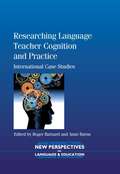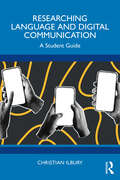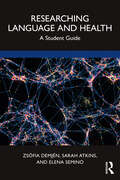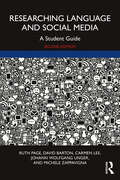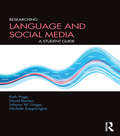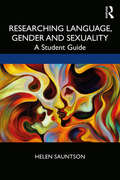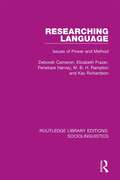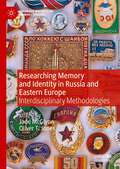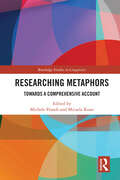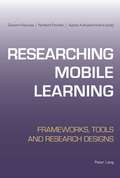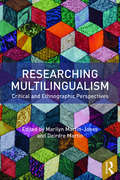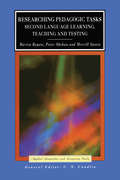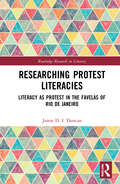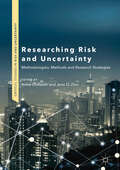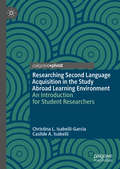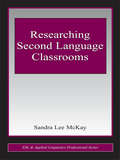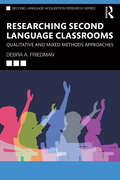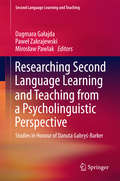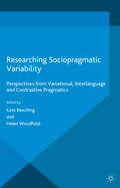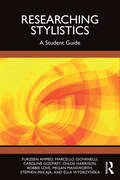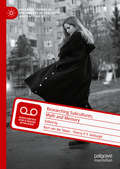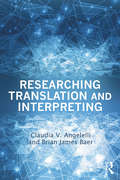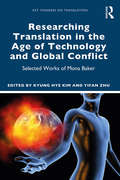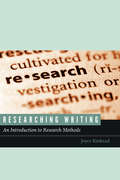- Table View
- List View
Researching Language Teacher Cognition and Practice
by Roger Barnard Anne BurnsThis book presents a novel approach to discussing how to research language teacher cognition and practice. An introductory chapter by the editors and an overview of the research field by Simon Borg precede eight case studies written by new researchers, each of which focuses on one approach to collecting data. These approaches range from questionnaires and focus groups to think aloud, stimulated recall, and oral reflective journals. Each case study is commented on by a leading expert in the field - JD Brown, Martin Bygate, Donald Freeman, Alan Maley, Jerry Gebhard, Thomas Farrell, Susan Gass, and Jill Burton. Readers are encouraged to enter the conversation by reflecting on a set of questions and tasks in each chapter.
Researching Language and Digital Communication: A Student Guide
by Christian IlburyThis student guide is an introduction to research on language and digital communication, providing an overview of relevant sociolinguistic concepts, analytical frameworks, and methodological approaches commonly used in the field. The book is a practical guide designed to help students develop independent research projects on language and digital communication. Topics covered include: the emergence of research on Computer Mediated Communication (CMC), interactional affordances and the design infrastructures of digital platforms, practical and ethical guidance in designing and implementing a research project on digital communication, contemporary approaches in the sociolinguistics of digital communication such as Computational Sociolinguistics (CS) and interactional analyses, and the impact of social and digital media on language change.Chapters are organised thematically, each supplemented with examples from various platforms and sociolinguistic contexts, as well as further reading and activities to scaffold students’ learning.The interdisciplinary relevance of this topic makes it key reading for students from A-level English language to undergraduate and postgraduate students in linguistics, English language, media studies, digital culture, and communications.Additional online resources are available on the Routledge Language and Communication Portal.
Researching Language and Health: A Student Guide
by Elena Semino Zsófia Demjén Sarah AtkinsResearching Language and Health explores key topics in illness and healthcare contexts through multiple linguistic lenses. This book highlights key themes, guides readers through the design stages of research and the ethical considerations specific to linguistic health research, and brings methods and methodologies to life by demonstrating how these can be applied to specific issues in context. Covering a wide range of health conditions, healthcare contexts, and data types, with an emphasis on those most accessible to students and new researchers, the authors foreground the ‘so what?’ of research and the impact that linguistic studies can have. Both a guide to key elements of the research process and a holistic view of research projects that have been successful, insightful, and impactful in different contexts, this is an essential text for advanced students and researchers in healthcare communication and applied linguistics.
Researching Language and Social Media: A Student Guide
by David Barton Michele Zappavigna Carmen Lee Ruth Page Johann Wolfgang UngerResearching Language and Social Media: A Student Guide introduces the linguistic frameworks currently used to analyse language found in social media contexts. This highly accessible guidebook outlines the practical steps and ethical guidelines entailed when gathering linguistic data from social media sites and platforms. In this new edition, the authors update the range of social media interactions used as examples and draw attention to important developments such as “fake news” and new areas of debate such as hate speech. Expanding the geographical and multilingual aspects, this edition also includes examples from Asia and the Arabic-speaking world. With updated methods that help students study the language of social media from a multimodal perspective, the recent uptake in image sharing, video-chat, and graphicons will also be addressed. Each chapter begins with a clear summary of the topics covered and also suggests sources for further reading to supplement the initial discussion and case studies. This timely book is an essential guide for students of English language and linguistics, media, and communication studies.
Researching Language and Social Media: A Student Guide
by David Barton Michele Zappavigna Ruth Page Johann Wolfgang UngerSocial Media is fast becoming a key area of linguistic research. This highly accessible guidebook leads students through the process of undertaking research in order to explore the language that people use when they communicate on social media sites. This textbook provides: An introduction to the linguistic frameworks currently used to analyse language found in social media contexts An outline of the practical steps and ethical guidelines entailed when gathering linguistic data from social media sites and platforms A range of illustrative case studies, which cover different approaches, linguistic topics, digital platforms, and national contexts Each chapter begins with a clear summary of the topics covered and also suggests sources for further reading to supplement the initial discussion and case studies. Written with an international outlook, Researching Language and Social Media is an essential book for undergraduate and postgraduate students of Linguistics, Media Studies and Communication Studies.
Researching Language, Gender and Sexuality: A Student Guide
by Helen SauntsonResearching Language, Gender and Sexuality leads students through the process of undertaking research in order to explore how gender and sexuality are represented and constructed through language. Drawing on international research, Sauntson incorporates a fluid understanding of genders and sexualities and includes research on a diverse range of identities. This accessible guidebook offers an outline of the practical steps and ethical guidelines involved when gathering linguistic data for the purpose of investigating gender and sexuality. Each chapter contains up-to-date information and empirical case studies that relate to a range of topics within the field of language, gender and sexuality, as well as suggestions for how students could practically research the areas covered. Student-friendly, this is essential reading for undergraduate and postgraduate students of English language, linguistics and gender studies.
Researching Language: Issues of Power and Method (Routledge Library Editions: Sociolinguistics)
by Deborah Cameron Kay Richardson Elizabeth Frazer Penelope Harvey M. B. RamptonOriginally published in 1992. This book discusses the possibilities of developing the research process in social science so that it benefits the subjects as well as the researcher. The authors distinguish between ‘ethical’, ‘advocate’ and ‘empowering’ approaches to the relationship between researcher and researched, linking these to different ideas about the nature of knowledge, action, language, and social relations. They then use a series of empirical case studies to explore the possibilities for ‘empowering research’. The book is the product of dialogue between researchers from a range of disciplines (anthropology, cultural studies, sociology and linguistics) and is for those working across the social sciences. Through combination of philosophical discussion, methodological recommendation and case-study illustration, it provides guidance that is practical without being simplistic.
Researching Memory and Identity in Russia and Eastern Europe: Interdisciplinary Methodologies (Palgrave Macmillan Memory Studies)
by Jade McGlynn Oliver T. JonesThis book offers a collection of innovative methodological approaches to Memory Studies in Russia and Eastern Europe. Providing insights into the relationship between memory and identity, the twelve chapters provide multidisciplinary analysis of how history is used to reinforce, remould, and reinvent national and group identities. This analysis includes a strong emphasis on interrogating the role of the researcher and the impact of methodology, exploring the field’s most pressing challenges, such as the subjectivity of remembrance, reception versus production of discourse, and the inclusion of marginal perspectives. By focussing on countries in which the past is highly politicised, including Serbia, Ukraine, Poland, Russia and the Baltic States, the volume also analyses the diverse – and often conflicting – ways in which historical narratives emerge from these states’ efforts to create new pasts that shape their respective visions of the future, with pressing ramifications across this region and beyond.
Researching Metaphors: Towards a Comprehensive Account (Routledge Studies in Linguistics)
by Michele Prandi Micaela RossiThis collection advocates for a more holistic picture of metaphor, extending the field’s focus beyond the cognitive paradigm and conventional metaphorical concepts to illustrate the possibilities afforded by the study of living metaphors. The volume brings together a diverse range of researchers in the discipline towards critically examining the presuppositions of the cognitive approach. The book shines a light on living metaphors – creative interpretations of conflictual meaning specific to a text or communicative act with their own unique functions – to throw into relief long-held tenets in existing metaphor research. Chapters reflect on the notion that creative metaphors spring from independent sources, not merely from metaphorical concepts, and the subsequent implications for our understanding of the relationship between linguistic forms and conceptual structures and the role of creative metaphors in organizing thought and action. Taken together, the book offers a complementary vision of languages and figures which integrates disparate lines of study within the cognitive paradigm with alternative perspectives for a more comprehensive portrait of metaphors. This book will be of interest to students and scholars interested in the study of metaphor, including such disciplines as theoretical linguistics, cognitive linguistics, semantics, literary studies, and philosophy of language.
Researching Metaphors: Towards a Comprehensive Account (Routledge Studies in Linguistics)
by Michele Prandi Micaela RossiThis collection advocates for a more holistic picture of metaphor, extending the field’s focus beyond the cognitive paradigm and conventional metaphorical concepts to illustrate the possibilities afforded by the study of living metaphors.The volume brings together a diverse range of researchers in the discipline towards critically examining the presuppositions of the cognitive approach. The book shines a light on living metaphors – creative interpretations of conflictual meaning specific to a text or communicative act with their own unique functions – to throw into relief long-held tenets in existing metaphor research. Chapters reflect on the notion that creative metaphors spring from independent sources, not merely from metaphorical concepts, and the subsequent implications for our understanding of the relationship between linguistic forms and conceptual structures and the role of creative metaphors in organizing thought and action. Taken together, the book offers a complementary vision of languages and figures which integrates disparate lines of study within the cognitive paradigm with alternative perspectives for a more comprehensive portrait of metaphors.This book will be of interest to students and scholars interested in the study of metaphor, including such disciplines as theoretical linguistics, cognitive linguistics, semantics, literary studies, and philosophy of language.
Researching Mobile Learning: Frameworks, Tools and Research Designs, Third Unrevised Edition
by Norbert Pachler Giasemi Vavoula Agnes Kukulska-HulmeThis book sets out the issues and requirements for mobile learning research, and presents recent efforts to specify appropriate theoretical frameworks, research methods and tools.
Researching Multilingualism: Critical and ethnographic perspectives
by Deirdre Martin Marilyn Martin-JonesResearching Multilingualism expertly engages with a new sociolinguistics of multilingualism, taking account of this new communicative order and the particular cultural and social conditions of our times. Seventeen chapters are divided into four sections covering: researching discourses, policies and practices; contemporary mobilities; Researching multilingual communication on-line; Multilingualism in research practice. This state-of-the-art overview of research methodologies in multilingual settings will be of interest for all students and researchers working in the area of multilingualism within Linguistics, Applied Linguistics, Education and Communication Studies.
Researching Pedagogic Tasks: Second Language Learning, Teaching, and Testing (Applied Linguistics and Language Study)
by Merrill Swain Martin Bygate Peter SkehanResearching Pedagogic Tasks brings together a series of empirical studies into the use of pedagogical tasks for second language learning, with a view to better understanding the structure of tasks, their impact on students, and their use by teachers. The volume starts with an introduction to the background and key issues in the topic area and is then organised into three sections: the first section focuses on the language and learning of students on tasks the second on the use of tasks in the language classroom the third on the use of tasks for language testing Each section begins with a succinct section introduction, and the volume concludes with an afterword relating the theme of the volume to issues in curriculum development. The chapters include both experimental and qualitative approaches to the topic, some providing original accounts of specific studies, others offering overviews of linked series of studies.
Researching Protest Literacies: Literacy as Protest in the Favelas of Rio de Janeiro (Routledge Research in Literacy)
by Jamie D. DuncanBy focusing on the textually mediated reactions of local residents, social movements, and media producers to policy changes implemented in the favelas of Rio de Janeiro, this book studies the development of literacy as a tool to mobilize, perform, and disseminate protest. Researching Protest Literacies presents a combination of ethnographic fieldwork and extensive archival research to analyse how traditional and technology-driven literacy practices informed a new cycle of social protest in favelas from 2006-2016. Chapters trace nuanced interactions, document changing power balances, and in doing so conceptualize five forms of literacy used to enact social change - campaigning literacies, memorial literacies, media-activist literacies, arts-activist literacies, and demonstration literacies. Building on these, the study posits protest literacies as a new way of researching the role of contemporary literacy in protest. This insightful monograph would be of interest to doctoral students, researchers, and scholars involved in the fields of literacy studies, arts education, and social movement studies, as well as those looking into research methods in education and international literacies more broadly.
Researching Risk and Uncertainty: Methodologies, Methods and Research Strategies (Critical Studies in Risk and Uncertainty)
by Jens O. Zinn Anna OlofssonUnderstanding and managing risk and uncertainty is a central task in contemporary societies characterised by rapid social, technological and environmental change. This book presents research approaches used by scholars who all share a passion to gain new insights in how individuals, organisations and societies approach uncertain futures and their potential dangers. The contributions illustrate the usefulness of particular methods and methodologies for researching risk in order to advance the understanding and management of social, technological and environmental challenges. With research strategies and approaches from sociology, psychology, history, linguistics, anthropology, and gender studies, Researching Risk and Uncertainty provides guidance and inspiration to students and scholars across a range of disciplines interested in risk, disaster and social crisis.
Researching Second Language Acquisition in the Study Abroad Learning Environment: An Introduction for Student Researchers
by Casilde A. Isabelli Christina L. Isabelli-GarcíaThis book is intended to introduce novice student researchers to second language acquisition in the study abroad learning environment. It reviews the existing literature and provides the emerging researcher an overview of the important factors to consider, informs them where to begin, and how to move forth an agenda for future research in this field. The book recognizes that aside from the academic advantages, study abroad programmes are an excellent tool for fostering extended and relevant interaction with native speakers. It provides reflection questions and activities, and guides the novice researcher in critically analysing existing research and to eventually carry out their own study. The book will be of use to beginning researchers who are new to linguistics in the areas of study abroad and second language acquisition.
Researching Second Language Classrooms
by Sandra Lee MckayThis text introduces teachers to research methods they can use to examine their own classrooms in order to become more effective teachers. Becoming familiar with classroom-based research methods not only enables teachers to do research in their own classrooms, it also provides a basis for assessing the findings of existing research. McKay emphasizes throughout that what a teacher chooses to examine will dictate which method is most effective. Each chapter includes activities to help readers apply the methods described in the chapter, often by analyzing research data.*Chapter I, Classroom Research, introduces the reader to major research purposes and research types as they relate to classroom research, the distinction between quantitative and qualitative research, the formulation of research questions and research designs, and ethical issues in research.*Chapter II, Researching Teachers and Learners, presents research methods that can be used to examine teachers' and learners' attitudes and behaviors: action research, survey research, interviews, verbal reports, diary studies, case studies, and ethnographies.*Chapter III, Researching Classroom Discourse, deals with methods that can be used to study the oral and written discourse of classrooms: interaction analysis, discourse analysis, text analysis, and ways to examine the social and political assumptions underlying the choice and presentation of content in second language teaching materials.*Chapter IV, Writing Research Reports, provides guidelines for both thesis writing and journal articles.Researching Second Language Classrooms is an ideal text for TESOL research methods courses and an essential resource for inservice teachers who wish to undertake classroom research.
Researching Second Language Classrooms: Qualitative and Mixed Methods Approaches (Second Language Acquisition Research Series)
by Debra A. FriedmanThis volume provides graduate students and experienced researchers with a comprehensive guide to applying qualitative and mixed methods in classroom-based research on second language learning and teaching.In addition to coverage of methods for collecting and analyzing data, Researching Second Language Classrooms offers in-depth discussions on a range of practical, theoretical, methodological, and ethical issues that can arise when conducting research in language classrooms. Throughout the volume, the emphasis on building both theoretical knowledge and practical skills helps to facilitate understanding of how qualitative and quantitative methods can complement each other. Each chapter includes examples drawn from a range of research settings as well as tasks for practicing data collection and analysis techniques, questions to prompt reflection, and suggestions for further reading.This book will serve as a valuable text for research methods courses as well as a resource for scholars and researchers of applied linguistics, SLA, and language learning and teaching.
Researching Second Language Learning and Teaching from a Psycholinguistic Perspective
by Mirosław Pawlak Dagmara Gałajda Paweł ZakrajewskiThis editedcollection explores the processes of secondlanguage learning and teaching from a psycholinguistic perspective. Authored by leading experts in the field, the book includes studies focusing on theoretical,empirical and practical aspects of second and foreign language education. PartOne offers contributionsdevoted to a range of learner-related factors, dealing with affective andcognitive variables, the process of reading and the acquisition of lexis. PartTwo brings together papers related to teacher awareness of second language instruction that focus on conversational styles, fostering interculturalpragmatics, teacher job satisfaction, the development of instructionalmaterials and challenges of teacher training in different contexts. It is of interest to researchers as well as graduate andpostgraduate students seeking fresh inspirations for their own empiricalinvestigations of the ways in which second and foreign languages are taught andlearned.
Researching Sociopragmatic Variability: Perspectives from Variational, Interlanguage and Contrastive Pragmatics
by Kate Beeching Helen WoodfieldResearching Sociopragmatic Variability showcases a range of research approaches to the study of speech acts and pragmatic markers across different languages and varieties of a language, investigating native and non-native usages and variation across gender, situation and addressee.
Researching Stylistics: A Student Guide
by Marcello Giovanelli Stephen Pihlaja Robbie Love Chloe Harrison Furzeen Ahmed Megan Mansworth Caroline Godfrey Ella WydrzynskaResearching Stylistics: A Student Guide explores key topics in literary and non-literary stylistics, examining the multiple ways in which students can undertake research in this discipline. Inherently practical and reader-friendly in focus, the book not only acts as a guide to key elements of the research process but also provides a useful overview of core knowledge and successful research projects in stylistics.The book provides an overview of stylistics as a discipline, identifying its core principles and working parameters. It outlines, in a clear and systematic way, the design stages and practical considerations needed to plan for and undertake research. Reflecting the latest thinking in contemporary stylistics, the book demonstrates how various methods can be applied to study a range of different text types. The practical activity of ‘doing’ stylistics and key examples from existing research are emphasised so that readers will be confident in their ability to apply their knowledge to their own working contexts.This is an essential text for advanced students and researchers working in stylistics and discourse analysis, and those working in interdisciplinary spaces who would be interested in exploring how stylistics can support their work.
Researching Subcultures, Myth and Memory (Palgrave Studies in the History of Subcultures and Popular Music)
by Bart van der Steen Thierry P. F. VerburghThis book brings together contributions that analyse how subcultural myths develop and how they can be studied. Through critical engagement with (history) writing and other sources on subcultures by contemporaries, veterans, popular media and researchers, it aims to establish: how stories and histories of subcultures emerge and become canonized through the process of mythification; which developments and actors are crucial in this process; and finally how researchers like historians, sociologists, and anthropologists should deal with these myths and myth-making processes. By considering these issues and questions in relation to mythmaking, this book provides new insights on how to research the identity, history, and cultural memory of youth subcultures.
Researching Translation and Interpreting: A Call For Dialogue Between Research And Practice (American Translators Association Scholarly Monograph Ser. #Xiv)
by Brian James Baer Claudia V. AngelelliThis volume offers a comprehensive view of current research directions in Translation and Interpreting Studies, outlining the theoretical concepts underpinning that research and presenting detailed discussions of the various methods used. Organized around three factors that are responsible for shaping the study of translation and interpreting today—post-positivist theoretical approaches, developments in the language industry, and technological innovations—this volume is divided into three parts: Part I introduces the basic concepts organizing translation and interpreting research, such as the difference between qualitative and quantitative research, between product-oriented and process-oriented studies, and between prescriptive and descriptive approaches. Part II provides a theoretical mapping of current translation and interpreting research, covering the theories underlying the current conceptualization of translation and interpreting, from queer studies to cognitive science. Part III explores the key methodological approaches to research in Translation and Interpreting Studies, including corpus-based, longitudinal, observational, and ethnographic studies, as well as survey and focus group-based studies. The international range of contributors are all leading research experts who use the methodologies in their work. They present the research aims of these methods, offer sample research questions that can—and cannot—be addressed by these methods, and discuss modes of data collection and analysis. This is an essential reference for all advanced undergraduates, postgraduates, and researchers in Translation and Interpreting Studies.
Researching Translation in the Age of Technology and Global Conflict: Selected Works of Mona Baker (Key Thinkers on Translation)
by Kyung Hye Kim Yifan ZhuMona Baker is one of the leading figures in the development of translation studies as an academic discipline. This book brings together fifteen of her most influential articles, carefully selected and grouped under three main topics that represent her most enduring contributions to the field: corpus-based translation studies, translation as renarration and translators in society. These applications and approaches have been widely adopted by translation scholars around the globe. The first section showcases Baker’s pioneering work in introducing corpus linguistics methodologies to the field of translation studies, which established one of the fastest growing subfields in the discipline. The second section focuses on her application of narrative theory and the notion of framing to the study of translation and interpreting, and her contribution to demonstrating the various ways in which translators and interpreters intervene in the negotiation of social and political reality. The third and final section discusses the role of translators and interpreters as social and political activists who use their linguistic skills to empower voices made invisible by the global power of English and the politics of language. Tracing key moments in the development of translation studies as a discipline, and with a general introduction by Theo Hermans and section introductions by other scholars contextualising the work, this is essential reading for translation studies scholars, researchers and advanced students.
Researching Writing: An Introduction to Research Methods
by Joyce KinkeadResearching Writing is an accessible, informative textbook that teaches undergraduates how to conduct ethical, authentic research in writing studies. The book introduces students to the research approaches used most often and offers a course framework for professors creating or teaching research courses themselves. Author Joyce Kinkead lays out the research process, including finding and defining questions, planning, and starting the research. Expository content introduces the language and methods of writing research, and specific methods are demonstrated in published examples, illustrating student work using student work and showing that it is possible for students to join the scholarly conversation in writing studies. Other features include student activities, instructor resources, student resources, and links to external content on journal websites, digital publications, YouTube, and similar work. The first-ever textbook for research methods in writing studies for undergraduates, Researching Writing takes a hands-on approach that excites and engages students in the depth and complexities of research and will influence the creation of courses in new writing majors as the field continues to grow.
